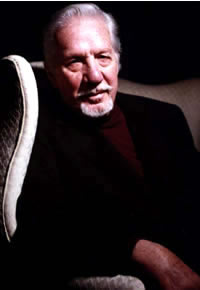A national treasure, a living symbol of Stratford, one of the world’s greatest stage actors, a lion of Canadian theatre. If the subject is William Hutt (BA 1948 Trinity, DLitt Sac Hon. 1996, LLD Hon. 1999), grand statements tend to follow. One writer even described Hutt’s rich baritone as reflecting “the unclouded summer, sweet autumn and crisp winter of the Canadian voice.”
Yet for all the exaltations, they still missed something – let’s call it the puckish, teasing charm of a long-awaited Canadian spring. And at age 82, Hutt still has it.
In an interview about his 50 years as a leading man at the Stratford Festival of Canada (King Lear, Prospero, Richard II) and a distinguished star in Canadian film and TV (James Tyrone in Long Day’s Journey into Night, Sir John A. Macdonald in The National Dream), he laces his pauses with equal doses of drama and irony. “I get recognized in the most unusual places. When I stop to get a hamburger on the side of the highway, I’ll get a note stuck on my windshield: ‘Keep up the great acting.’ That’s really wonderful – the recognition, not the hamburger.”
But perhaps Hutt’s greatest delight is that he became a star in a country that had few professional stage opportunities. Now Canada has an expansive professional theatre system: Stratford is recognized internationally, and Toronto is North America’s third-leading theatre city. “Theatre in Canada and my career seemed to progress hand in hand,” he says.
After serving five years as a medic in the Second World War, Hutt enrolled at Trinity College and soon discovered Hart House Theatre. He became part of a golden circle of emerging theatrical talent that included Ted Follows (BA 1959 UC), Eric House (BA 1950 UC), Charmion King (BA 1947 UC) and others. “We all wanted to be professional actors,” says Hutt. “I don’t know where we even got the notion.”
After graduating in 1948, Hutt went to work in summer stock for $5 a week. He joined Stratford in its inaugural season in 1953 and made a decision to stay in Canada and support the country’s theatre. “I saw this hemorrhaging of talent across the border,” he says. “If everyone left, we would never have a cultural picture in this country at all. I felt that I should stay and do what I could. And once Stratford started, what better circumstances could I find myself in? I had continuous work. I was associated with the greatest playwright in the English language and with a company that produces his plays with love, passion and a good budget.”
Hutt has also appeared on and off Broadway, in London’s West End and in theatres across Great Britain, but he has stayed true to his first commitment. “It has been wondrous to see all this expansion in the past 50 years,” he says. “Now there’s a great deal of huffing and puffing that Stratford will strangle on its own success. But no theatre will die of success.”
As for himself, Hutt says, “I may cut down what I do at Stratford. I’ll still do bits of TV and film, to keep the wolf from the door. Sometimes small roles are more rewarding. You can slip in, steal a scene and then go home.”
Recent Posts
U of T’s 197th Birthday Quiz
Test your knowledge of all things U of T in honour of the university’s 197th anniversary on March 15!
Are Cold Plunges Good for You?
Research suggests they are, in three ways
Work Has Changed. So Have the Qualities of Good Leadership
Rapid shifts in everything from technology to employee expectations are pressuring leaders to constantly adapt






